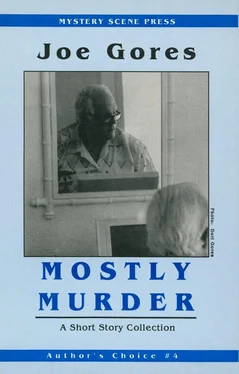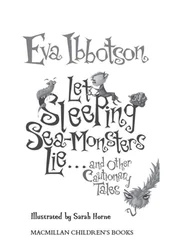A short man wearing dirty overalls and chewing a large cud of tobacco came out.
“Fill it up — regular,” said Falkoner.
He waited in the store by the vegetable counter. Three dirty bare-footed children slammed through the screen door and began noisily clamoring at the candy counter like puppies worrying a bone. A tall faded lady in a washed-out dress came from the bowels of the store to scream harsh threats at them.
When the blue Ford rounded the corner and braked sharply, Falkoner went out the door and around behind the store to the primitive outdoor restrooms. Lattice works into which thick vines had grown flanked the entrance. He slammed the lean-to door loudly, stepped out of sight behind the vines, and took the Magnum from its shoulder holster. Feet scuffed in the dust and foliage rustled. Door hinges squeaked cautiously.
The young red-haired man had freckles and a homely face and a switchblade knife in one broad paw. As he turned from the empty shanty, puzzled, Falkoner stepped around the lattice work and slammed the Magnum down on his hand. Pimples of sweat popped out on his hard young face. The knife fell. He snatched clumsily for the Magnum with his left hand, breathing hoarsely, his eyes already sick with the sure frightful knowledge of defeat.
Falkoner’s gun rammed him in the stomach, bending him over, then it clipped him across the back of the neck and knocked him to his knees. A knee driven into his freckled face upset him against the wall. The Magnum struck his bright hair with a sound like a wet rag slapping concrete. He tipped forward on his face and was still.
Falkoner dragged him around the corner of the shanty and killed him.
The short man was still cleaning bugs from the Mercury’s windshield when the blue Ford dug out and sped past the gas pumps.
Night had darkened San Francisco when Jack Falkoner took the down ramp off the freeway at Seventh, crossed Market, and went up Larkin. He drove over the hill to Pacific, turned right, crossed over the Broadway tunnel on Mason, and parked the Ford. His hands shook a little as he checked the Magnum: going after Mr. David was something like going up against God.
Turning downhill at Glover, a narrow one-block alley, he walked on the right-hand side, crossed over, and came up the other side breathing heavier from the incline. There were no cars he knew, no people at all, so he turned in at an ornate wooden gate and climbed a series of stone steps. In less than a minute he had opened the heavy oak door with a small metal pick and was prowling the five-room apartment. His rubber soles made no sound on the polished floors and thick carpets. On Sundays Mr. David and the girl he kept there usually watched Ed Sullivan, but tonight the apartment was empty.
I can wait, Falkoner thought as he returned to the Ford, and slid in behind the wheel.
A round hard object poked the base of his neck and a smooth voice said:
“Hands on the head, Sweets, and slide over slow.”
Strangely, he thought of his first hit. It had been in a car like this and the man had said: 'I'm not afraid of you.' He did not say anything. A dark figure came erect in the back seat and another crossed the street swiftly to get in under the wheel and hold a gun on Falkoner while the first one took the Magnum. Later the man had cried and babbled and even prayed. Falkoner had been much younger then and had laughed before shooting him in the back of the head.
A long black sedan drifted around the corner and crawled up behind them. It was remarkably like an undertaker’s car. When the man at the wheel flipped his lights twice the Ford pulled out. The sedan followed. They took Pine to Presidio, cut over to Balboa, and drove out through the dark still Avenues decorously, like a funeral procession. Falkoner’s head ached and he felt sick to his stomach. When he looked at the unfamiliar face of the driver, the man in the back seat said, “Don’t try it, Sweets.” The driver stayed hunched over with both hands on the wheel. They would not let him smoke a cigarette.
Surf grumbled against the concrete breakwaters as the Ford turned left onto the Great Highway at Playland on the Beach. Only a few rides and stalls were open, for a chill March mist had rolled in off the Pacific. The wipers monotonously sucked haze from the windshield. After several miles they swung in facing the ocean on a wide dirt lot where neckers parked on moonlit nights. The sedan drew up behind them, parallel to the highway, with dimmed lights. There were no other cars. A tangled hedge of dark twisted cypress, bent and gnarled by the incessant wind, screened them from the houses beyond the highway.
The doorhandle felt cold and slippery to Falkoner’s fingers. Bitter words flooded his mouth like bile and his lips bled keeping them in: Jack Falkoner is not afraid, Jack Falkoner is not afraid... He flung open the door and threw himself at the opening. Behind him something plopped twice. Eyes staring in disbelief, he fell dizzily out of the half-open door and crashed down on one shoulder. He tried to say something, he wanted to say it, it was important: the whole significance of his life had been only death. He had meant no more than a casual accident or a mild epidemic that snuffs out a few people by blind chance. If they would just give him a little time for change, another month for living... Before he could ask, orange flame spurted and lead ripped his throat, slamming his head into the dirt with an ineluctable finality.
“Pay me,” chortled Mr. David in high good humor. The sedan had turned by Fleishaker Zoo and was threading through an expensive residential district on broad Sloat Avenue.
The man in the back seat with him was dressed in a camel’s hair coat and had crisp wavy hair receding from his forehead. He had once been a lawyer but had been disbarred. With obvious reluctance he took a hundred dollar bill from his wallet and handed it to his employer.
“I still don’t see how you knew he’d come up here. I thought one of the boys along the border would tag him.”
Mr. David chuckled richly. He wore too much cologne in a vain effort to disguise the constant odor of perspiration that clung to his obese body like the smell of bad cooking. His heavy features were shadowed by his hatbrim.
“Psychology, Norman, psychology. Jack wasn’t afraid of me or the Organization or Old Nick himself. It was his sort of stunt, to try and take me with him. I’m sorry about Red, though. I told him to be careful but you know how kids are.”
“How can you be so sure Falkoner got him?”
“The Ford. Jack would never have had that car if Red was alive, that’s for sure. And Jack was a bad one, at that.”
“I like ’em bad,” put in the man in the middle of the front seat. He was removing a steel cylinder from the muzzle of his .32, his deadly hands fondling the revolver with the quick and supple movements of a musician fingering his guitar.
“And you can’t tell me Sweets wasn’t scared. I saw his face when he went under.”
Mr. David delicately shifted his ponderous bulk and belched. His weight made the seat coils creak slightly.
“We’ll never know now, will we?” he demanded with unction. As the car stopped for the light on 19th Avenue he added: “Take a left here, Freddie. I’ve got a date with a new girl.”
Down toward Playland, a motorcycle siren whined thinly, like a short-haired mongrel in cold weather. The chilled huddle of people could see the flat pink glow of its close-set red eyes coming up at them through the fog. Moaning wind tore their breaths away in gray tatters. Occasional cars whipped past, wet tires hissing on the shiny pavement. By the white empty glare of their patrol car spotlight, two wet-tunicked policemen resembled grave robbers rolling bodies as they lifted Falkoner’s corpse by one shoulder to see if it bore any life. On his face, almost ferocious in its intensity, was frozen an immutable expression of pure terror.
Читать дальше







![Джон Макдональд - The Hunted [Short Story]](/books/433679/dzhon-makdonald-the-hunted-short-story-thumb.webp)




